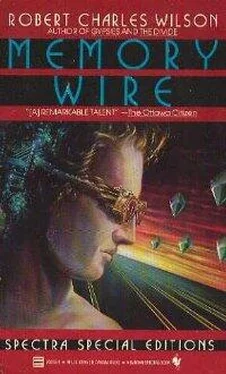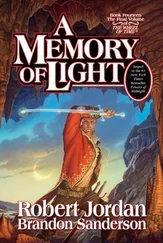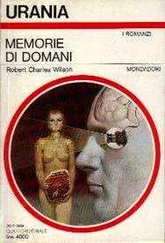Robert Wilson - Memory Wire
Здесь есть возможность читать онлайн «Robert Wilson - Memory Wire» весь текст электронной книги совершенно бесплатно (целиком полную версию без сокращений). В некоторых случаях можно слушать аудио, скачать через торрент в формате fb2 и присутствует краткое содержание. Год выпуска: 1987, ISBN: 1987, Издательство: Bantam Spectra, Жанр: Фантастика и фэнтези, на английском языке. Описание произведения, (предисловие) а так же отзывы посетителей доступны на портале библиотеки ЛибКат.
- Название:Memory Wire
- Автор:
- Издательство:Bantam Spectra
- Жанр:
- Год:1987
- ISBN:978-0-553-26853-9
- Рейтинг книги:4 / 5. Голосов: 1
-
Избранное:Добавить в избранное
- Отзывы:
-
Ваша оценка:
- 80
- 1
- 2
- 3
- 4
- 5
Memory Wire: краткое содержание, описание и аннотация
Предлагаем к чтению аннотацию, описание, краткое содержание или предисловие (зависит от того, что написал сам автор книги «Memory Wire»). Если вы не нашли необходимую информацию о книге — напишите в комментариях, мы постараемся отыскать её.
Memory Wire — читать онлайн бесплатно полную книгу (весь текст) целиком
Ниже представлен текст книги, разбитый по страницам. Система сохранения места последней прочитанной страницы, позволяет с удобством читать онлайн бесплатно книгу «Memory Wire», без необходимости каждый раз заново искать на чём Вы остановились. Поставьте закладку, и сможете в любой момент перейти на страницу, на которой закончили чтение.
Интервал:
Закладка:
He looked back at Keller.
Keller was awake now, watching him with wide, frightened eyes.
Oberg turned to the keyboard and called up a global delete. The machine paused and then inquired whether he was certain he wanted to empty all the contents of this file. He tapped an affirmation and watched as the monitors cycled through a kind of apocalypse: Cuiaba vanished, the Amazon lost in dead pixels, Pau Seco gone, Belem gone, all disappeared into chaos, signals become noise, Keller’s memory trace evaporating into the air as if it had never existed.
Oberg smiled.
Keller was pale, blinking.
Oberg had parked his car directly outside the editing booth, and it was simple to maneuver Keller to his feet and outside without being seen. There was a guard on the road at the entrance gate but he did not glance up as Oberg passed. And they were away free.
He drove a mile down a firebreak: road into the hills. When he could safely do so, Oberg pulled up on the shoulder and opened the door on Keller’s side. They had reached a wasteland of rusting oil derricks; the road beside the car was littered with bottle glass and aluminum cans glistening in the sunlight. Keller was staring at him now, waiting, strangely calm.
Oberg reached behind Keller’s head in a gesture that was almost tender and used the pressure of his thumbnail to activate the joychip.
Keller’s face contorted with sudden pain.
Oberg used his feet to shove Keller out of the car.
Keller fell among the weeds and high grass, hidden, dying.
Oberg closed the door, wiped his bloody thumb against his handkerchief, and began the long drive toward the sea.
CHAPTER 24
Teresa was watching the sun go down when she resorted to the pills again.
She had climbed to the top of this raggedy float shack with the pills in her pocket, not intending to swallow any —the desire was never that explicit—but just holding them in reserve, savoring their reassuring closeness. She wore a sweater. Coming on winter now. The nights were early and cool. She sprawled across the tin roof with her back against a heat exchanger, feeling the thrum of the bilge pumps and watching the western sky fade to red.
She took out a handful of pills and regarded them.
They were small, black, unmarked, faintly resinous. Faintly sordid. They had been cooked, she thought, in some Float laboratory, formed in a primitive pill press, sold furtively to addicts … to her.
But she needed them. It was not a question of self-indulgence. It was as if her traumatic ’lith trance in the Ver-o-Peso had opened old wounds: she needed the anesthesia. She had dreamed about the little girl, increasingly felt her as a tangible presence, scolding and demanding. Now, for instance. Now the little girl wanted her to throw the pills away. Her voice was a real voice, faint but distinct.
I saved your life.
But that was crazy.
In the fire. You would have died. You wanted to die. I saved your life.
Mysteriously, she had become two people.
I saved your life. You took the pills, t made the sculptures. You sold them…
No, Teresa thought.
She took several of the pills into her mouth and swallowed them dry, choking a little. Too many, maybe. But they made the voice fade away.
The euphoria began as a sense of lightness spreading from her stomach. It was inside her, until it reached her head, and then she was inside it; the euphoria contained her perfectly. The sky was dark now, the wind from the tidal dam chilling, but she didn’t care. She wrapped the sweater over her shoulders and leaned back, breathing in a deep, steady rhythm. All over the Floats lanterns were flickering on. A fog rolled down the canals.
She was oblivious when she heard Byron’s voice as he entered the float, arid Cruz Wexler’s following, their conversation—they must not have known she was up here—like a tired duet between broken instruments. It was funny, she thought, how sad they sounded. How hopeless and resigned. She closed her eyes and listened to the sound of their voices, the last night cries of nesting gulls. There were high lunar tides out beyond the dams, fresh water from the spillways creating a gentle, pulsing swell. The shack rocked under her. She sighed, alone in this luminous darkness. All voices stilled, she thought. What a blessing silence was.
But then—moved by some muted note of alarm deep within her—she sat up and saw the lone man approaching down a boardwalk from the east.
It was later than she had realized, most of these balsas dark now, only a dim glow from the dance shacks out along the seawall. The man walked methodically and with an air of intense, frightening vigilance. He came alongside the shanty float. He stopped. Teresa, on the flat tin roof, ducked out of his line of vision.
Death at the door, she thought.
It was a strange idea but she considered it calmly. Death had always been at the door. Since the fire, so many years ago. She had been courting him. Seducing him. What was remarkable was that he had taken so long to get here.
She listened to him knock.
CHAPTER 25
Keller lay for a time on the verge of the road by the ancient oilfield.
The sun raked over his closed eyes; he saw starbursts. The gravel under him felt as acute as knives and razors. When an airliner passed overhead, the roar was a demented music.
He wanted to move but could not.
He was lucid for moments at a time, but even his lucidity was painful: an acute, exaggerated sobriety in which the world invaded his senses.
He understood what was happening to him. Oberg had plugged something into his socket, something like a joychip but more intense, something that was sending him rapidly into burn-out. It was clever. A clever kind of murder. If no one found him, he would die; dead, he would look like any other burn-out case. If he were discovered here before he died, he would be mistaken for terminal and remanded to a death ward. No culpability, no obvious crime.
The prospect was so daunting that it overwhelmed him. The voltage pulsing down his wires acted as an amplifier, stimulating the flow of acetylcholenes, flooding him with dopamine. Everything was painful. Breathing was painful. He felt the air searing in and out of him like fire. The slightest motion, a twitch, was agonizing. He opened his eyes once, and the sun was like a lance; he screamed.
He moved in and out of delirium. Delirious, he believed he was back in Brazil, in the war, in the manioc field in Rondonia. The voltage down his wires sluiced out these buried memories. He convulsed, and in one of his convulsions broke the metallic tape Oberg had used to bind his hands. Blood ringed his wrists. It was painful, but no more painful than any other sensation. He rolled away from the margin of the road and felt himself tumbling downward.
When he opened his eyes again, the sky was dark. A ghastly yellow illumination flooded out from the sodium vapor lamps planted along the firebreak. He had rolled down an embankment into a stand of weeds; his wrists were gashed, his face abraded.
The pain was agonizing but briefly—for the moment —bearable. Moaning, he sat up.
He knew this interlude of sanity would not last long. He reached behind his head and touched the raw wound Oberg had left there, felt the spindly angle of the joychip. But not a joychip. It was eroding him, he thought, eating him from the inside. The idea frightened him and threatened to draw him back down into a blind panic. The joychip was slippery with blood and he could not grasp it or withdraw it; it was embedded too deeply in the socket. Just touching it sent spears of pain through him.
He closed his eyes, opened them. Gritty rasp of eyelids over cornea. The hammering of his own heart was deafening. He was in the midst of a wasteland: the insect shapes of oil derricks stilled for decades, their corrosion like scrollwork in the bleak light. He tried to stand up and fell back, shrieking. The earth spun dizzyingly beneath him.
Читать дальшеИнтервал:
Закладка:
Похожие книги на «Memory Wire»
Представляем Вашему вниманию похожие книги на «Memory Wire» списком для выбора. Мы отобрали схожую по названию и смыслу литературу в надежде предоставить читателям больше вариантов отыскать новые, интересные, ещё непрочитанные произведения.
Обсуждение, отзывы о книге «Memory Wire» и просто собственные мнения читателей. Оставьте ваши комментарии, напишите, что Вы думаете о произведении, его смысле или главных героях. Укажите что конкретно понравилось, а что нет, и почему Вы так считаете.












